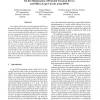Free Online Productivity Tools
i2Speak
i2Symbol
i2OCR
iTex2Img
iWeb2Print
iWeb2Shot
i2Type
iPdf2Split
iPdf2Merge
i2Bopomofo
i2Arabic
i2Style
i2Image
i2PDF
iLatex2Rtf
Sci2ools
107
Voted
IOLTS
2008
IEEE
2008
IEEE
On the Minimization of Potential Transient Errors and SER in Logic Circuits Using SPFD
Sets of Pairs of Functions to be Distinguished (SPFD) is a functional flexibility representation method that was recently introduced in the logic synthesis domain, and promises superiority in exploring the flexibility offered by a design over all previous representation methods. In this work, we illustrate how the SPFD of a particular wire reveals information regarding the number of potential transient errors that may occur on that wire and may affect the output of the circuit. Using an SPFD-based rewiring method, we then demonstrate how to evolve a logic circuit in order to minimize the total number of potential transient errors in the circuit and, consequently, reduce its Soft Error Rate (SER) while controlling the effect on the rest of the design parameters, such as area, power, delay, and testability. Experimental results on ISCAS’89 and ITC’99 benchmark circuits indicate that the SER can be reduced at no additional overhead to any of the design parameters.
IOLTS 2008 | Potential Transient Errors | Representation Methods | Software Engineering | flexibility Representation Method |
Related Content
| Added | 31 May 2010 |
| Updated | 31 May 2010 |
| Type | Conference |
| Year | 2008 |
| Where | IOLTS |
| Authors | Sobeeh Almukhaizim, Yiorgos Makris, Yu-Shen Yang, Andreas G. Veneris |
Comments (0)

